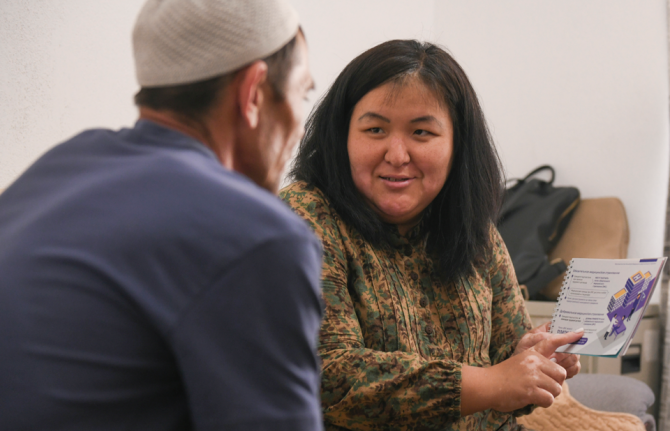
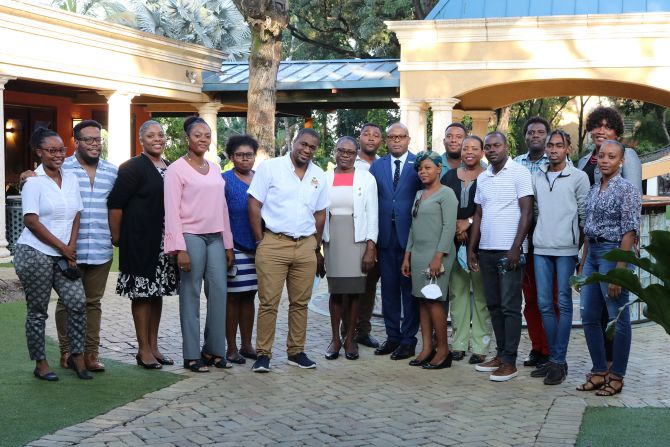

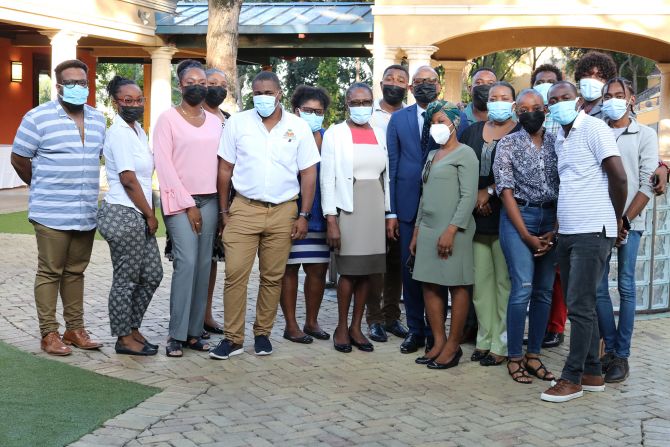
Feature Story
Strengthening Haiti’s HIV response through community-led monitoring
03 December 2021
03 December 2021 03 December 2021“I have not been taking my meds for seven months,” said Carla Joseph (not her real name), a transgender woman living with HIV in Haiti. “I need a reliable, direct place that will not ask me for a referral letter … to get back into care.”
She is speaking to one of Haiti’s community-led monitoring (CLM) field officers from the Civil Society Forum Observatory, who over the past year have been working to learn more about how to connect diagnosed people to treatment and ensure that those already in care are better served.
“During the monitoring we met many clients waiting for their turn to be consulted and get their drug refilled,” said Elisabeth Jacques, a Community-Led Monitoring Field Coordinator. “Shouldn’t the services be at the best day and time for the patient?”
UNAIDS is supporting the community-led monitoring work being conducted by Haiti’s Civil Society Forum Observatory. Community-led monitoring is an accountability mechanism to improve people’s access to HIV services and the quality of care they experience. The process is led and implemented by communities of people living with HIV, key populations and other vulnerable groups.
This initiative is part of a coordinated effort by partners, including the Ministry of Public Health and Population and the United States Government through the United States President’s Emergency Plan for AIDS Relief (PEPFAR). It aims to maintain and expand access to HIV services for Haiti’s estimated 150 000 people living with HIV, including 30 000 who are not yet aware of their status.
In its first report, the Civil Society Forum Observatory called attention to the need to improve client-centred services by extending service hours and reducing waiting times. It has also recommended an increase to six months for the supply of antiretroviral medicines dispensed to stable people living with HIV. Additionally, the community-led monitoring exercise unearthed a need to improve treatment literacy related to the concept of U = U (undetectable = untransmittable).
“We should build the capacity of civil society to do this sensitization work. They are more familiar with the clients. When someone is lost to follow-up, community members know how to speak to them and encourage them to come back. If we empower the community through community-led monitoring we can have a better handle of what’s going on,” said Soeurette Policar, the Coordinator of the Civil Society Forum Observatory.
The Head of HIV Prevention at the Ministry of Public Health and Population, Steve Mc Allan Smith, welcomed the recommendations. “Community-led monitoring will tell us how services are being rendered in the community and how people are experiencing those services from a client perspective. This approach will tell us how to tailor interventions to the specific needs of the patients. It will also help us address testing issues. But mostly it will help us retain people in care. Reaching the targets is really good,” he said. “But maintaining them long-term is what we are going for.”
Over the past year, the country has contended with intersecting crises. One month after the assassination of its president, Haiti endured a devastating earthquake, followed by a tropical storm. Worsening organized crime and an epidemic of kidnappings have had dire implications for the daily life of Haitians. In recent months a fuel shortage has made it even more difficult for people and organizations to conduct their affairs. And all this under the spectre of COVID-19.
Poverty, gender-based violence and the discrimination faced by people living with HIV and key population communities undermine people’s ability to stay on treatment. The challenging socioeconomic and security context only makes things worse. According to PEPFAR data, almost 8000 Haitians came off HIV treatment last year.
However, as the UNAIDS Country Director for Haiti, Christian Mouala, noted, Haiti was able to successfully implement multimonth dispensing of antiretroviral medicines to 88% of people on HIV treatment during COVID-19. This was thanks to coordinated efforts under the leadership of the Ministry of Public Health and Population and the collaboration of many stakeholders, including Haitian civil society.
“The people and health system here are resilient and adaptable,” Mr Mouala said. “At this time community leadership must become even more central to developing and implementing strategies to ensure people enjoy the best possible HIV, health and social support services.”
Region/country
Related

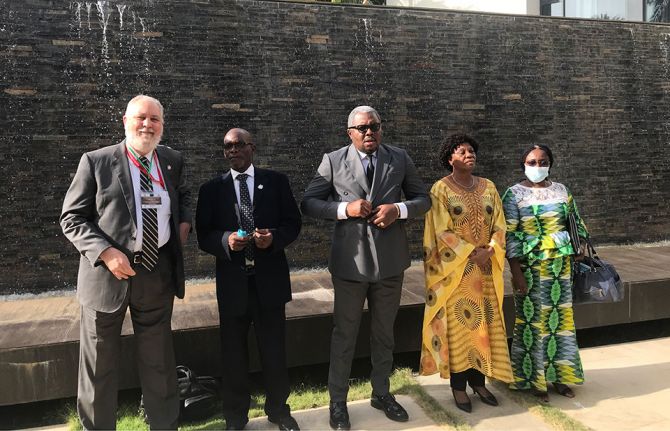
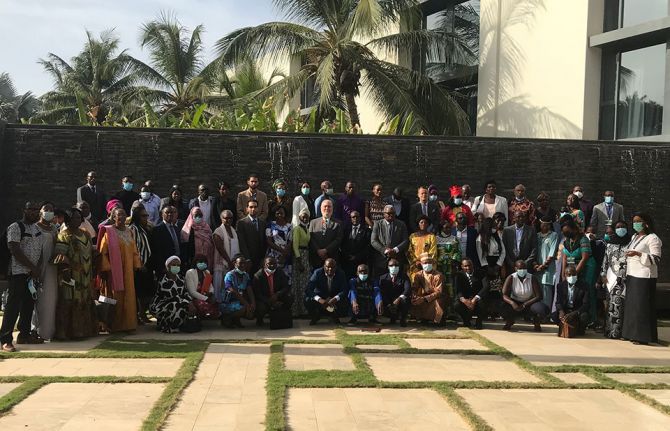
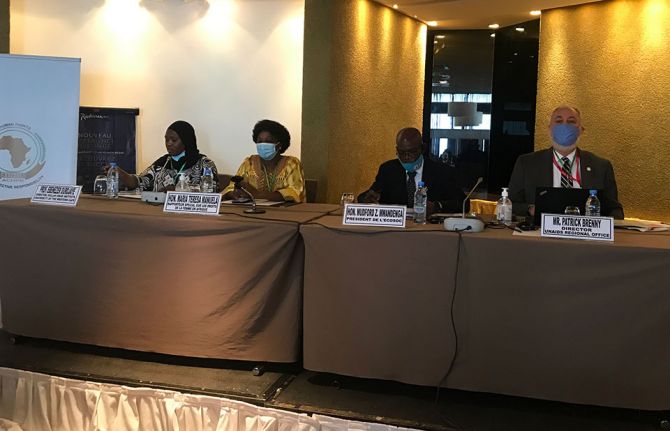
Feature Story
High-level continental seminar on the right to health and social protection in Africa
09 December 2021
09 December 2021 09 December 2021Health is a right, but in Africa it is estimated that up to 38% of the population delay or forgo health care due to its high costs and out-of-pocket expenditures. Africa is the continent with the greatest proportion of the population not having access to social protection and adequate health care, and where human needs are the greatest.
Limited local production and dependence on external markets and financing are barriers to equitable access to medicines and other medical supplies in Africa. All African countries are net importers of medical and pharmaceutical products, with most of them importing between 70% and 90% of the medicines they consume.
The advent of the COVID-19 pandemic and its devastating consequences in Africa demonstrate that there is still a long way to go in terms of implementation and domestication of the various international, continental, regional and national human rights instruments.
To address these shortcomings, the African Commission on Human and Peoples’ Rights (ACHPR) held the High-Level Regional Seminar on the Right to Health and Social Protection in Africa, in Dakar, Senegal, from 8 to 10 December. It aimed to raise awareness among member states, national human rights institutes, nongovernmental organizations and other partners on the issue of deficient health-care systems and insufficient social protection coverage, to share best practices regarding health-care systems and social protection and to formulate key recommendations for implementation.
“We should not have a handout, but solve our own health problems in Africa. Dependence on international financing makes progress vulnerable,” said Maria Teresa Manuela, an ACHPR Commissioner and a Special Rapporteur on the Rights of Women in Africa.
Financing the right to health is a strong area of collaboration between UNAIDS and ACHPR that will be crystallized in a report to be launched in 2022.
“Pandemics can be a catalyst for transformative financing reforms that uphold the right to health for those left behind. Lessons from the AIDS response and many other leadership examples in Africa need to be leveraged to further mobilize leadership and investments to end AIDS and other pandemics, end inequalities and accelerate realization of the right to health for all,” said Patrick Brenny, the Director of the UNAIDS Regional Support Team for Western and Central Africa. He encouraged stakeholders to generate evidence to demonstrate the impact on the right to health of financing strategies and proposed fiscal policies, to increase development assistance in more than 35 countries and to promote the greater participation of parliamentarians in the financing dialogue, bridging the gap with those who make fiscal decisions.
Our work
Related

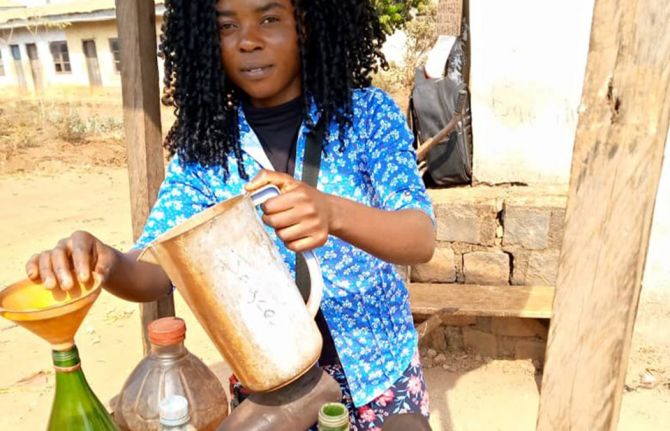
Feature Story
Social protection systems addressing inequalities
09 December 2021
09 December 2021 09 December 2021The COVID-19 pandemic has widened inequalities, claimed lives and disrupted HIV and tuberculosis (TB) services. It has affected the most vulnerable, including people living with, at risk of and affected by HIV. By reducing inequalities, social protection facilitates the uptake of HIV, TB and other essential health services. It improves adherence to HIV and TB treatment, reduces HIV risk and mitigates the social and economic impacts of HIV and COVID-19.
In 2015, all countries pledged to reduce inequalities within and between countries as part of the Sustainable Development Goals. This pledge is reinforced by the Global AIDS Strategy 2021–2026: End Inequalities, End AIDS and the 2021 United Nations Political Declaration on AIDS. Governments must promote inclusive social and economic growth and access to social protection for vulnerable people, including key populations, people living with HIV and others.
A satellite session at the 2021 International Conference on AIDS and STIs in Africa showcased UNAIDS’ call to action on reducing inequalities in support of key populations, children, adolescents and people living with HIV accessing social protection benefits.
Quotes
“Inclusive social protection systems are required to end inequalities and help end AIDS by ensuring that 45% of people living with, at risk of and affected by HIV access social protection benefits.”
“HIV and COVID-19 provide a double threat for children and adolescents. Robust social protection systems that have the capacity to support food security, reduce poverty and increase schooling, mental health and access to sexual and reproductive health services are required.”
“COVID-19 also strikes at gender inequalities. More women living with HIV are dying from COVID-19 than men living with HIV because of wealth disparities. Social protection is an essential response to COVID-19 and HIV. Through social protection, Eswatini has provided a range of programmes, including cash incentives.”
“Those most at risk of infection or death from infectious diseases like HIV, tuberculosis and malaria, and now COVID-19, are people who face a range of human rights and gender-related barriers to accessing health services—gay men and other men who have sex with men, people who use drugs, transgender people, people in prisons and other closed settings, adolescent girls and women, displaced people and refugees. To address inequalities and ensure no one is left behind, we must support countries to focus on the poorest and the most marginalized communities.”
Our work
Related

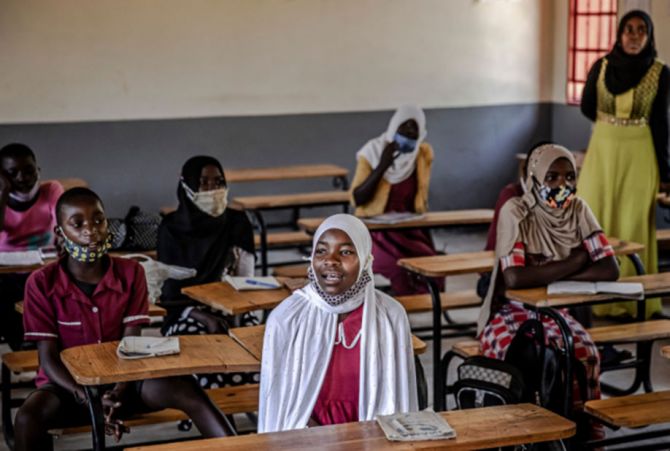
Feature Story
Leaders from Eastern and Southern Africa recommit to the education, health and well-being of adolescents and young people
08 December 2021
08 December 2021 08 December 2021Ministers of education, health, gender, and youth in Eastern and Southern Africa (ESA), expressed overwhelming support to continue their joint efforts towards creating a brighter future for adolescents and young people in the region by empowering the youth and protecting their health and well-being to achieve the common goals.
A high-level Ministerial Meeting held virtually on Monday, as part of the International Conference on AIDS and sexually transmitted infections (ICASA) 2021 reaffirmed and expanded the commitment first made in 2013.
Eight years ago, Ministries of Health and Education from 20 countries - supported by the Southern African Development Community (SADC) and the East African Community (EAC) – joined forces with regional UN organisations to agree on a joint commitment, known as the ESA Commitment. They recognized the urgent need for more systematic scale up of sexuality education and youth-friendly SRH services in the region.
“Africa has a large population of young people, and we must do all in our power to make opportune of this demographic dividend. Our young people are our hope for the development of our continent, Africa. As leaders of today, we need to prioritise the health and wellbeing of young people for the betterment of Africa”
While important strides have been made toward improving sexual and reproductive health and rights (SRHR) outcomes among adolescents and young people, significant gaps and barriers still exist to the realization of the ESA Commitment targets. An evaluation of the 2013 commitment revealed progress in reducing new HIV infections, increasing comprehensive HIV knowledge and creating a conducive policy environment. However, the evaluation also indicated that accelerated efforts are urgently needed to reduce early and unintended pregnancy, gender-based violence and curb the effect of humanitarian emergencies, such as the COVID-19 pandemic. This further underscored the need to renew the commitment, through expanding and aligning it with the SDG Agenda 2030.
“Young Africans must have the facts and confidence to stay safe and healthy, live a dignified life and contribute positively to their community and countries. They must trust us, their elders, to tell them the truth. Therefore, as Religious Leaders we pledge our support today to the ESA Commitment that seeks to enhance efforts in ensuring the health and wellbeing of our children and young people”
Extensive consultations at national and regional level with governments, adolescents and young people, communities and development partners across sectors led to a new updated regional commitment and targets for 2022-2030.
“The ESA Commitment has opened doors that were closed to us as young leaders. It has provided an opportunity for further advocacy on SRHR to change the lives of adolescents and young people. We strongly encourage and support an expansion and extension of the ESA Commitment towards Agenda 2030”
This commitment by the ministers of Health, Gender, Education and Youth is expected to accelerate investments to the education, health and well-being of adolescents and young people in ESA.
“Today we are putting a spotlight on adolescents and young people, and we are set to promote national and international inter-sectoral collaboration. We call on and rally all development partners and well-wishers to come on board and ride with us in the renewed ship that is headed to a land where our adolescents and young people are healthier, more productive, and continual to champion inclusive development of our societies”
Related

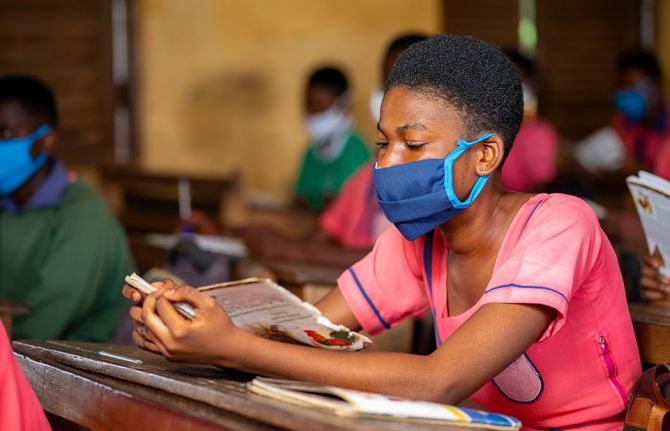
Feature Story
The importance of comprehensive sexuality education for Africa’s young people
07 December 2021
07 December 2021 07 December 2021A message of support for the ESA Commitment from Professor Mbulelo Dyasi, Vice Chair, Board of Directors, INERELA+, delivered at ICASA 2021
As religious leaders, we have a trusting relationship between us and our congregations. As beholders of God’s truth and a belief system based on faith, our relationships with our congregants and communities are based on a strong basis of belief and as custodians of good values. This provides us with a platform to advocate and motivate for the betterment of our people from a faith perspective while we can also work together with our congregations in finding solutions to the challenges they face in their environments.
Today, we are in a situation where our nation and our continent are at the right place to advance in areas of economics, infrastructure and human resources. This is because we have young populations who are fast growing up to be productive citizens. These young people need direction and guidance to be able to make good decision, have positive family lives and be good citizens. And as religious leaders we play an important role in providing this guidance. Parents in our congregations know their role in providing this guidance. And we live in a modern society with modern education and health systems, so we need teachers, social workers and health workers to also provide this guidance. Each has a role to play in improving society.
We trust a government that acts in our best interests. Since 2000, the South African Government has been providing our children with the education and guidance they need. This education, called Life Orientation/Life Skills, where sexuality education is embedded, complements the values and direction that we provide as religious leaders through our sermons and that parents provide at home. We have to make sure that our children can negotiate issues of sexuality and relationships from a position of knowledge and power, rather than a position of ignorance and fear. From a position of truth and science, rather than a position of misinformation and helplessness.
There are those who try to spread fear and disinformation, creating panic and claiming to be the guardians of family values. The truth is that many of us who are believers, who are parents, who are teachers, are united on human dignity. And sexuality education promotes human dignity. Because sexuality education ensures that our children learn to treat each other with respect and dignity from an early age. It ensures that our children learn to think about what is right and safe for them, and how to avoid coercion, sexually transmitted infections, including HIV, and early and unintended pregnancies. It helps to keep our children safe from abuse by teaching them about their bodies.
Young Africans must have the facts and confidence to stay safe and healthy, live a dignified life and contribute positively to their community and countries. They must trust us, their elders, to tell them the truth. Therefore, as religious leaders we pledge our support today to the ESA Commitment, which seeks to enhance efforts in ensuring the health and well-being of our children and young people. We commit to work with our governments to accelerate action towards realizing the agreed upon targets so that in 2030 we can all see the vision of an AIDS-free generation.
As religious leaders we hereby endorse the ESA Commitment towards 2030 aiming to ensure that we close the gap of comprehensive knowledge of our young people to protect themselves from new HIV infections, early and unintended pregnancies and gender-based violence and early child marriages. We promise to engage with our constituencies to create an enabling environment for adolescents and young people to access sexual and reproductive health services and use our platforms to empower parents to be able to talk with their children on issues affecting their health and well-being. With the challenge of COVID-19, we also commit ourselves to work together with our communities in finding innovative ways to ensure access to information and essential services during times of crisis. Working together we will surely win the fight against HIV and other pandemics.
Thank you!
Professor Mbulelo Dyasi, Vice Chair, Board of Directors, INERELA+
Related

Feature Story
Commemorating World AIDS Day in the Central African Republic
06 December 2021
06 December 2021 06 December 2021World AIDS Day 2021 saw the authorities in the Central African Republic and others involved in the HIV response in the country come together to provide information on HIV, promote HIV prevention, treatment and care and show their solidarity in the face of the pandemic. This year, the President and Head of State of the Central African Republic, and President of the National AIDS Council, Faustin-Archange Touadéra, presided over the ceremony in the commune of Bégoua, near the capital, Bangui.
In line with the Dakar Call to Reinvent the Response to the HIV Pandemic, adopted at the recent High-Level Regional Summit on HIV/AIDS in Western and Central Africa, Mr Touadéra urged the Ministers of Health and Population and of Budget and Finance to ensure that 500 million central African francs is included in the government’s 2022 budget for the HIV response. He also tasked the Prime Minister to report on the actions taken in the HIV response. One of the four pillars of the Dakar Call to Action is to increase national and international resources devoted to HIV in the region by 33% by 2025.
Mr Touadéra also noted the importance of removing financial barriers to accessing health services for people living with HIV.
Bienvenu Gazalima, the President of the Network of People Living with HIV in the Central African Republic (RECAPEV), said that, “Access to antiretroviral drugs has improved, from 12% of all people living with HIV in 2013 to 58% by the end of 2020, but remains one of the lowest in the world. HIV treatment is available in only 10% of the country’s health facilities.”
On the eve of the World AIDS Day commemoration, messages from the Minister of Health and Population and UNAIDS were broadcast on major radio stations and national television. Information on preventing new HIV and COVID-19 infections was given out, especially to young people, in several provinces of the country. With the support of UNAIDS, sensitization caravans criss-crossed the streets of Bangui for several days to spread messages on HIV transmission, HIV prevention, vulnerability to HIV and HIV-related discrimination.
“We are at a crossroads. Leaders have a choice between bold actions and half measures. The transformative approach we need to end AIDS will also protect humanity from future pandemics,” said Marie Engel, UNAIDS Country Director for the Central African Republic, a.i.
Region/country
Related

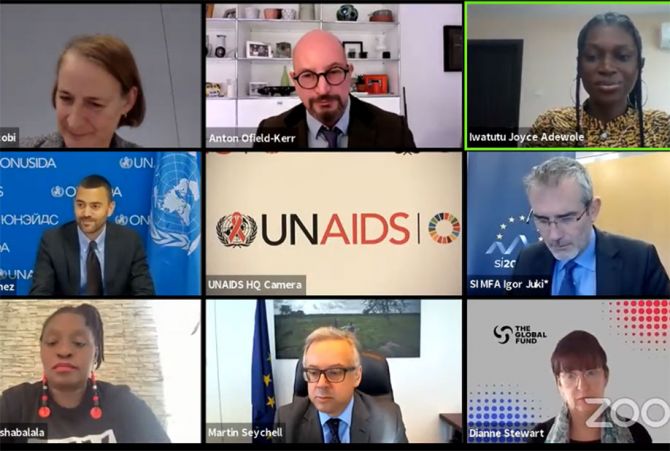
Feature Story
Learning lessons from current and future pandemics
26 November 2021
26 November 2021 26 November 2021An event hosted by the Slovenian Presidency of the Council of the European Union (EU), in conjunction with UNAIDS and Aidsfonds, recently brought together thought leaders and decision-makers with the goal of discussing the EU’s engagement in the AIDS response, the effects of COVID-19 and the role of communities.
The virtual session, organized as a lead-up to World AIDS Day on 1 December, moderated by youth activist Iwatutu Adewole, convened representatives of the European Commission, the European Parliament, the Slovenian Presidency of the Council of the EU, the Global Fund to Fight AIDS, Tuberculosis and Malaria (Global Fund) and HIV civil society leaders from South Africa and Kenya.
During the panel discussion, the speakers examined the progress made in the AIDS response and the numerous challenges that hinder the achievement of the 2030 targets. The Treatment Action Campaign’s Chairperson, Sibongile Tshabalala, underlined that the fight against HIV had not yet been won. “Although faced with serious challenges, such as lack in access to services, sexual and gender-based violence and persistent stigma and discrimination, we are talking today about the successes and progress we have made,” she said. She stated that community voices were important for the AIDS response and to fight COVID-19.
The severity of the challenges faced by the response was echoed by Helena Dalli, the EU’s Commissioner for Equality. During her keynote speech, she emphasized the importance of tackling inequalities to ending AIDS, advancing the human rights of people living with HIV and making societies better prepared to beat COVID-19 and other pandemics.
The panellists reaffirmed their commitment to ending inequalities, calling for the protection of the human rights of people living with and at risk of HIV, the repealing of outdated laws that criminalize HIV transmission and same-sex sexual relations, addressing sexual and gender-based violence, safeguarding the sexual and reproductive health and rights of girls and women and empowering community-led responses. Joyce Ouma, Influence and Engagement Advisor at Y+, stressed the need to meaningfully engage in all processes and let young women lead at all stages, from conception to evaluation. “We need to place people at the centre, we need to support community-led initiatives,” said Martin Seychell, the Deputy Director-General of the European Commission’s Directorate-General for International Partnerships.
The EU is a committed ally of the multisectoral global AIDS response, as reflected in its political commitments and contributions. It places gender equality and human rights protection at the centre of its external action, through mechanisms such as the Gender Action Plan 2021–2025, the Action Plan on Human Rights and Democracy 2020–2024 and the upcoming Youth Action Plan. To date, it has invested €2.6 billion in the response to HIV, of which €2.1 billion went to the Global Fund. The Global Fund’s new strategy for 2023–2028 will be crucially important to the achievement of UNAIDS’ new targets. “We know what we need to do, we just have not scaled the actions nor had sufficient funding,” said Dianne Stewart, Head of Donor Relations at the Global Fund.
Earlier this year, the European Parliament approved a resolution on accelerating progress and tackling inequalities towards ending AIDS as a public health threat by 2030. The Chair of the European Parliament’s Gender Equality and Women’s Rights Committee, Evelyn Regner, expressed the European Parliament’s “full support” to scaling up investments in UNAIDS and the Global Fund and to prioritizing the fight against stigma and discrimination, sexual and gender-based violence and the criminalization of same-sex sexual relations and other punitive and discriminatory laws and policies.
The UNAIDS Chief of Staff, Efraim Gomez, concluded by reminding the panel that the world is off track to end AIDS by 2030, as the 2020 targets had not been met, and called for sustained funding and investment into the HIV response. Referring to the EU’s leading role in pandemic preparedness, he said, “The HIV infrastructure is the backbone of pandemic preparedness, and so investing in HIV yields far beyond it in pandemic preparedness. Help us end inequalities. All AIDS-related deaths are avoidable, and all new HIV infections as well. It is just a question of mustering the will to beat AIDS.”
Watch

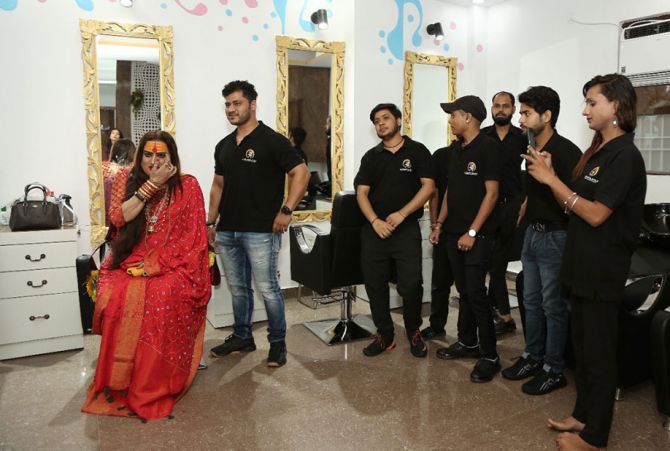
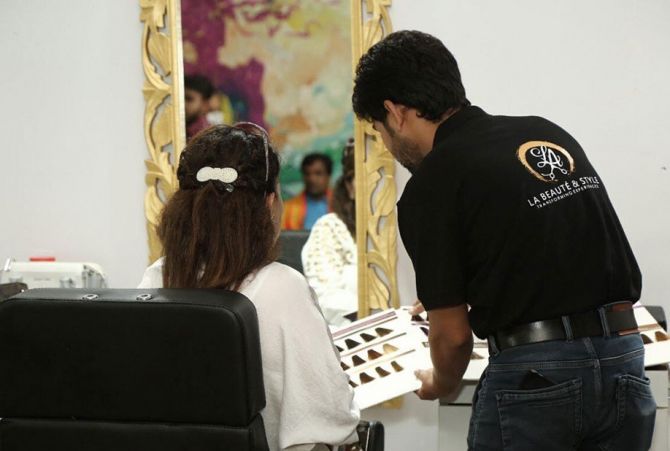
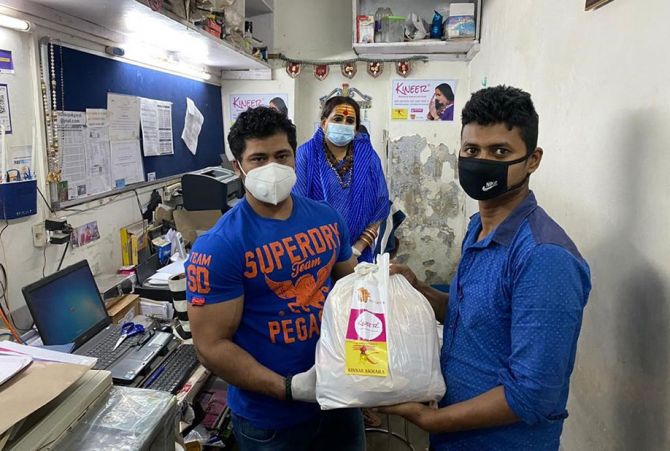
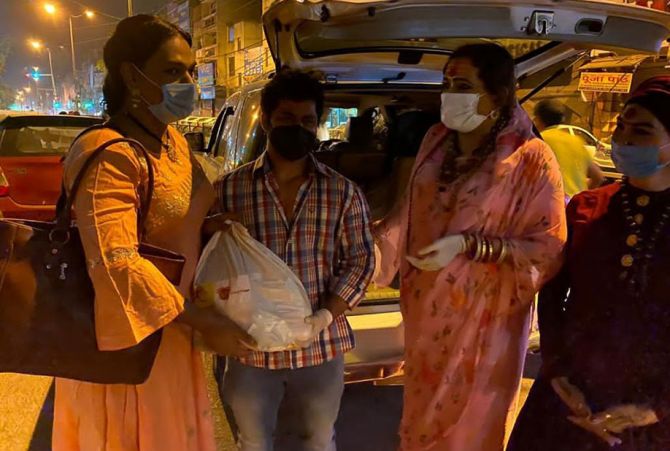
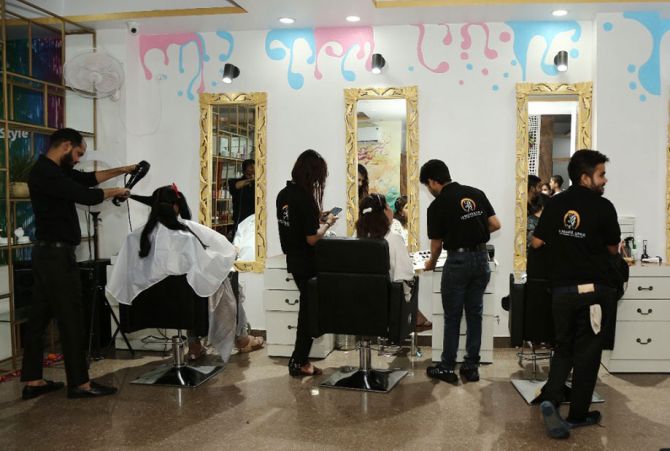
Feature Story
Ready to be the change
26 November 2021
26 November 2021 26 November 2021La Beauté and Style salon, created by UNAIDS Solidarity Fund grantee Gaurav Trust, opened its doors to customers in September 2021. Located in Ghaziabad, Uttar Pradesh, India, it is one of the few Indian salons that is established, managed and run by members of the transgender community. The salon is a social enterprise set up to provide socioeconomic support and to address the age-old, yet deeply woven, stigma that the community faces in India.
“There are skilled and talented individuals from the community who fail to make a mark in the beauty industry because of stigma surrounding their identities. I know of a transwoman who was let go from a salon despite being an exceptional worker,” said Laxmi Narayan Tripathi, a key member of the social enterprise.
Despite the Transgender Persons (Protection of Rights) Act 2019, the transgender community continues to face denial and rejection in areas such as employment, health and public services.
Ms Narayan Tripathi has been a transgender activist since 1999 and has seen discourse evolve from HIV to now encompass funding opportunities and social enterprises led by the community. Aryan Pasha, who is a lawyer, activist and India’s first transgender man bodybuilder, and Ms Narayan Tripathi are both board members of the Gaurav Trust, a community-based organization working on the promotion and protection of the health and rights of sex workers, gay men and other men who have sex with men and the lesbian, gay, bisexual, transgender and intersex community, and young people. Its programmes specially focus on using its networks to strengthen project management, skills-building and livelihood support to nurture a self-sustaining community. Despite their collective advocacy and action over the years to advance the welfare, rights and health of transgender people, stigma remains a major challenge.
While the Gaurav Trust team acknowledge that breaking stigma is a long process, they also believe that change is inevitable. By recruiting and engaging community members, La Beauté and Style salon is an opportunity for the team to establish a platform promoting socioeconomic inclusion. It will provide a conducive space for many interested people to leverage beauty and grooming training facilities and develop essential skills, enabling them to earn a livelihood.
“During the COVID-19 pandemic, we saw people from the community who had lost jobs and had no place to live. So why not have a space where our own people can feel safe and comfortable and also create jobs and experts from within the community?” said Mr Pasha. To uphold this vision, 70% of people employed at the La Beauté and Style salon will belong to the transgender community.
The uplifting reaction from the community towards social entrepreneurship models encouraged Ms Narayan Tripathi to leverage her network to mobilize additional funding from partners and local bodies to sustain and grow the enterprise. Through the example of La Beauté and Style salon in Ghaziabad, they have been successful in creating a pipeline of other diverse social entrepreneurship projects led by the transgender community for the coming months. The team believes that interesting entrepreneurial ideas that exist within the community can succeed if funding is made available.
Established to support vulnerable populations to survive the immediate impact of the socioeconomic crises exacerbated by the COVID-19 pandemic, the UNAIDS Solidarity Fund is a critical instrument in building sustainable income mechanisms.
“Through these tools of self-reliance, we are nurturing a variety of leaders. Today, our diverse grantees are enhancing community leadership to set the path for future entrepreneurs. And the community-led social enterprises are ultimately working towards the collective objective of inclusion and socioeconomic prosperity,” said Nandini Kapoor Dhingra, Community Support Adviser at the UNAIDS Country Office for India.
For the fellow grantees of the Solidarity Fund, this project has set a precedent for sustainability and growth beyond the seed funding. As a message to the fellow grantees, Ms Narayan Tripathi said, “From the point of seed funding, it is important to think of sustainability. It remains essential to look for partners and local funders to enhance the project. It takes hard work and advocacy, but success is certain.”
Currently, the second cohort of community members is being trained in Pune, which will host the newest franchise of La Beauté and Style salon. Through this journey of hope, highs and lows, community members have been keen to grow and uplift the socioeconomic fabric of the transgender community in India.
Watch this social enterprise featured on Indian national television.
Watch
Region/country


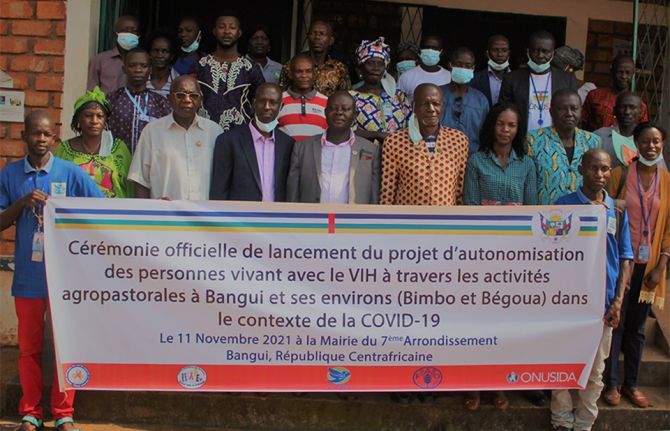
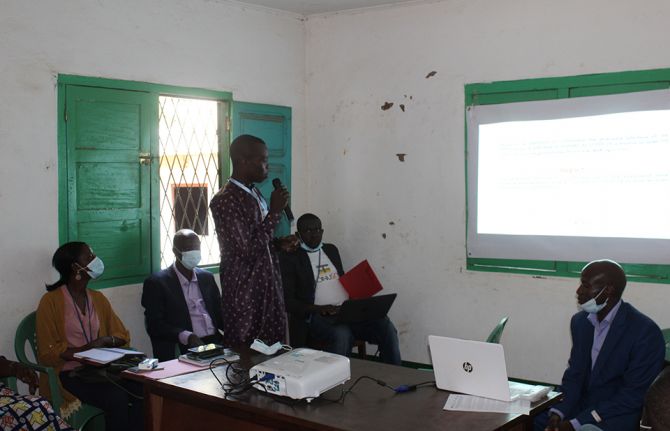
Feature Story
Supporting people living with HIV with income generation in the Central African Republic
17 November 2021
17 November 2021 17 November 2021On 11 November, a project to support the empowerment of nearly 400 people living with HIV through training and involvement in agropastoral activities was launched in the seventh arrondissement of Bangui, Central African Republic.
According to Joseph Tagbale, the Mayor of the seventh arrondissement, “This project is timely and comes as a breath of fresh air, as people living with HIV have paid a heavy price during the COVID-19 pandemic, firstly because of their high risk of infection due to their weak immune systems and secondly because of the collapse of their means of subsistence due to repeated confinements.”
The Multi-Partner Trust Fund granted the UNAIDS Country Office for the Central African Republic US$ 150 000 to support activities for people living with HIV in the context of COVID-19. These activities were chosen in collaboration with the Comité National de Lutte Contre le Sida (CLNS), the Ministry of Health and the Central African Network of People Living with HIV (RECAPEV) and will be implemented by the United Nations Food and Agriculture Organization and the international nongovernmental organization Solidarité pour la Paix et le Développement Intégré.
The activities consist of agropastoral activities (small-scale livestock farming and other farming activities), the production of face masks and income-generating activities, such as sewing, catering and the sale of soap and kitchen utensils. All these activities will enable people living with HIV to sustainably meet their needs and better adhere to their antiretroviral therapy, since due to the COVID-19 pandemic many people living with HIV have stopped taking their treatment because of problems in accessing food. “COVID-19 has destroyed all our progress in adherence to treatment, and people living with HIV have a lot of difficulty feeding themselves, as many are unemployed,” said Bienvenu Gazalima, the National Coordinator of RECAPEV.
The income-generating activities will be supported in four arrondissements of Bangui and in two surrounding communes, Bimbo and Bégoua, which were selected because they have large numbers of people on antiretroviral therapy.
Throughout the project, peer educators will educate people living with HIV on treatment adherence and other health issues, such as COVID-19 prevention and vaccination. Emphasis will be placed on involving women in the activities. “I am delighted that women living with HIV are so strongly integrated in this project, because it is they who have paid the highest price during this crisis,” said Marcelline Seremandji, adviser to civil society associations at CLNS.
“In the Central African Republic we are witnessing how structural inequalities and lack of income have direct impacts on health and HIV outcomes. The lower someone’s social and economic status, the poorer their health is likely to be. Addressing food insecurity and malnutrition, keeping adults earning an income and keeping children in school helps to ensure the efficacy of HIV treatment,” said Marie Engel, the Director, a.i., of the UNAIDS Country Office for the Central African Republic.
Region/country

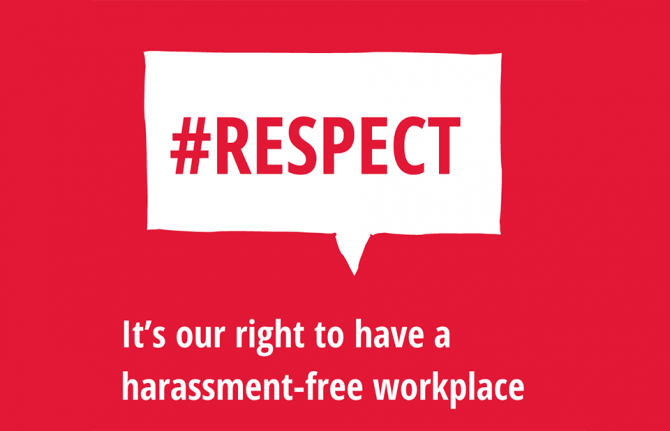
Feature Story
UNAIDS Respect campaign against abusive conduct
16 November 2021
16 November 2021 16 November 2021Launched by the UNAIDS Executive Director, Winnie Byanyima, in mid-September, the Respect campaign is raising awareness among UNAIDS staff of the UNAIDS/World Health Organization Policy on Preventing and Addressing Abusive Conduct, updated in early 2021.
“It is our right to work in a respectful environment, a right that each and every one of us is entitled to, as well as obligated to uphold. Together, we will make our workplace equal, safe and empowering,” wrote Ms Byanyima in a message to all staff.
The policy expanded the scope of protection to include interns and consultants and now describes, with examples, types of abusive conduct. The new policy also removed the requirement for complaints to be made within a specific time limit.
“A few colleagues came up to me to share their own stories and situations when they didn’t feel valued. They were appreciative that we are naming these issues. This is a way to show our support and explain avenues to address these situations to those who had to endure them. It also increases the stakes for those who act in this way because they know that all of us know this is not acceptable,” said Mumtaz Mia, who leads the culture transformation process at UNAIDS.
The campaign aims at improving knowledge and understanding of what is considered abusive conduct by using everyday examples and is based on six different experiences representative of abusive conduct, from discrimination, to abuse of authority, to sexual harassment and homophobia.
“Every staff member and consultant at UNAIDS is entitled to and has the right to expect a safe and respectful workplace. This is an obligation that each one of us, from the Executive Director to our ancillary staff, has to our workmates. Our staff surveys have told us that hasn’t always been the experience for everyone working in the organization and so the Respect campaign is a much-needed and positive development which the Staff Association hopes will contribute to building a better and healthier UNAIDS workplace for each and every one of us,” said Stuart Watson, Chair of the UNAIDS Secretariat Staff Association.
As part of the campaign, conversations on abusive conduct are taking place within UNAIDS teams, with staff invited to learn more about abusive conduct. Looking to the future, the campaign will continue, building on the current campaign and reflecting the lived experiences of staff across the organization.
The recent UNAIDS Global Staff Survey revealed that 55% of respondents feel that UNAIDS takes allegations of discrimination, abuse of authority, ill treatment and sexual harassment seriously. Half of the respondents also said that they feel comfortable to speak up and address colleagues about incivility or exclusionary behaviour they experience or observe. While these are above benchmark figures, UNAIDS’ management will keep monitoring the situation. The aim is to narrow the gap between experienced abusive conduct and reporting and action against the conduct, as well as the overall reduction of abusive conduct for a safe, equal and empowered UNAIDS for everyone.


